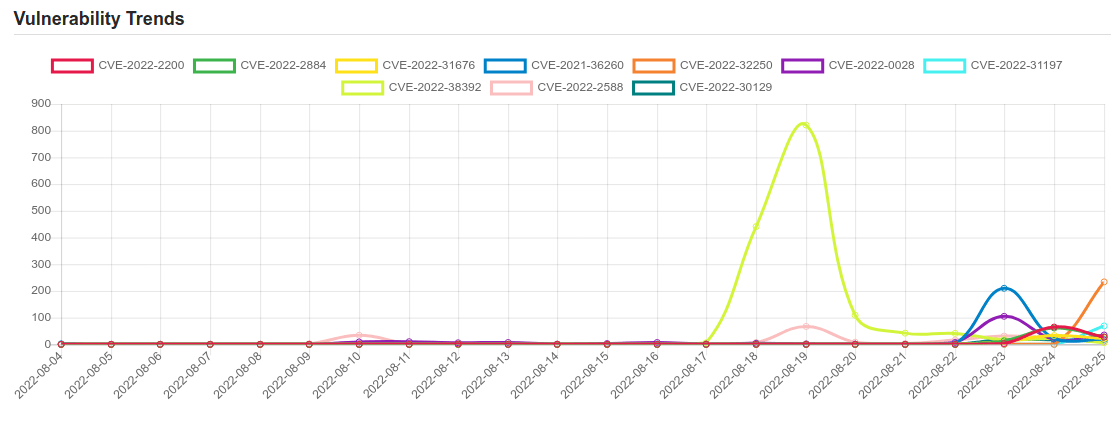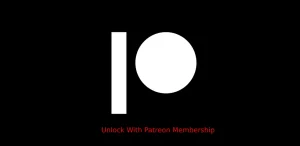Daily Vulnerability Trends: Fri Aug 26 2022

| CVE NAME | CVE Description |
| CVE-2022-27925 | Zimbra Collaboration (aka ZCS) 8.8.15 and 9.0 has mboximport functionality that receives a ZIP archive and extracts files from it. An authenticated user with administrator rights has the ability to upload arbitrary files to the system, leading to directory traversal. |
| CVE-2022-22715 | Named Pipe File System Elevation of Privilege Vulnerability. |
| CVE-2022-34265 | An issue was discovered in Django 3.2 before 3.2.14 and 4.0 before 4.0.6. The Trunc() and Extract() database functions are subject to SQL injection if untrusted data is used as a kind/lookup_name value. Applications that constrain the lookup name and kind choice to a known safe list are unaffected. |
| CVE-2021-44228 | Apache Log4j2 2.0-beta9 through 2.15.0 (excluding security releases 2.12.2, 2.12.3, and 2.3.1) JNDI features used in configuration, log messages, and parameters do not protect against attacker controlled LDAP and other JNDI related endpoints. An attacker who can control log messages or log message parameters can execute arbitrary code loaded from LDAP servers when message lookup substitution is enabled. From log4j 2.15.0, this behavior has been disabled by default. From version 2.16.0 (along with 2.12.2, 2.12.3, and 2.3.1), this functionality has been completely removed. Note that this vulnerability is specific to log4j-core and does not affect log4net, log4cxx, or other Apache Logging Services projects. |
| CVE-2022-34699 | Windows Win32k Elevation of Privilege Vulnerability. |
| CVE-2022-32893 | An out-of-bounds write issue was addressed with improved bounds checking. This issue is fixed in iOS 15.6.1 and iPadOS 15.6.1, macOS Monterey 12.5.1, Safari 15.6.1. Processing maliciously crafted web content may lead to arbitrary code execution. Apple is aware of a report that this issue may have been actively exploited. |
| CVE-2021-22941 | Improper Access Control in Citrix ShareFile storage zones controller before 5.11.20 may allow an unauthenticated attacker to remotely compromise the storage zones controller. |
| CVE-2022-2200 | No description provided |
| CVE-2022-2884 | No description provided |
| CVE-2022-31676 | VMware Tools (12.0.0, 11.x.y and 10.x.y) contains a local privilege escalation vulnerability. A malicious actor with local non-administrative access to the Guest OS can escalate privileges as a root user in the virtual machine. |
| CVE-2021-36260 | A command injection vulnerability in the web server of some Hikvision product. Due to the insufficient input validation, attacker can exploit the vulnerability to launch a command injection attack by sending some messages with malicious commands. |
| CVE-2022-32250 | net/netfilter/nf_tables_api.c in the Linux kernel through 5.18.1 allows a local user (able to create user/net namespaces) to escalate privileges to root because an incorrect NFT_STATEFUL_EXPR check leads to a use-after-free. |
| CVE-2022-0028 | A PAN-OS URL filtering policy misconfiguration could allow a network-based attacker to conduct reflected and amplified TCP denial-of-service (RDoS) attacks. The DoS attack would appear to originate from a Palo Alto Networks PA-Series (hardware), VM-Series (virtual) and CN-Series (container) firewall against an attacker-specified target. To be misused by an external attacker, the firewall configuration must have a URL filtering profile with one or more blocked categories assigned to a source zone that has an external facing interface. This configuration is not typical for URL filtering and, if set, is likely unintended by the administrator. If exploited, this issue would not impact the confidentiality, integrity, or availability of our products. However, the resulting denial-of-service (DoS) attack may help obfuscate the identity of the attacker and implicate the firewall as the source of the attack. We have taken prompt action to address this issue in our PAN-OS software. All software updates for this issue are expected to be released no later than the week of August 15, 2022. This issue does not impact Panorama M-Series or Panorama virtual appliances. This issue has been resolved for all Cloud NGFW and Prisma Access customers and no additional action is required from them. |
| CVE-2022-31197 | PostgreSQL JDBC Driver (PgJDBC for short) allows Java programs to connect to a PostgreSQL database using standard, database independent Java code. The PGJDBC implementation of the `java.sql.ResultRow.refreshRow()` method is not performing escaping of column names so a malicious column name that contains a statement terminator, e.g. `;`, could lead to SQL injection. This could lead to executing additional SQL commands as the application’s JDBC user. User applications that do not invoke the `ResultSet.refreshRow()` method are not impacted. User application that do invoke that method are impacted if the underlying database that they are querying via their JDBC application may be under the control of an attacker. The attack requires the attacker to trick the user into executing SQL against a table name who’s column names would contain the malicious SQL and subsequently invoke the `refreshRow()` method on the ResultSet. Note that the application’s JDBC user and the schema owner need not be the same. A JDBC application that executes as a privileged user querying database schemas owned by potentially malicious less-privileged users would be vulnerable. In that situation it may be possible for the malicious user to craft a schema that causes the application to execute commands as the privileged user. Patched versions will be released as `42.2.26` and `42.4.1`. Users are advised to upgrade. There are no known workarounds for this issue. |
| CVE-2022-38392 | A certain 5400 RPM OEM hard drive, as shipped with laptop PCs in approximately 2005, allows physically proximate attackers to cause a denial of service (device malfunction and system crash) via a resonant-frequency attack with the audio signal from the Rhythm Nation music video. |
| CVE-2022-2588 | No description provided |
| CVE-2022-30129 | Visual Studio Code Remote Code Execution Vulnerability. |
| CVE-2022-37042 | Zimbra Collaboration Suite (ZCS) 8.8.15 and 9.0 has mboximport functionality that receives a ZIP archive and extracts files from it. By bypassing authentication (i.e., not having an authtoken), an attacker can upload arbitrary files to the system, leading to directory traversal and remote code execution. NOTE: this issue exists because of an incomplete fix for CVE-2022-27925. |
| CVE-2022-1529 | No description provided |
| CVE-2022-26923 | Active Directory Domain Services Elevation of Privilege Vulnerability. |
A considerable amount of time and effort goes into maintaining this website, creating backend automation and creating new features and content for you to make actionable intelligence decisions. Everyone that supports the site helps enable new functionality.
If you like the site, please support us on Patreon using the button below


To keep up to date follow us on the below channels.








